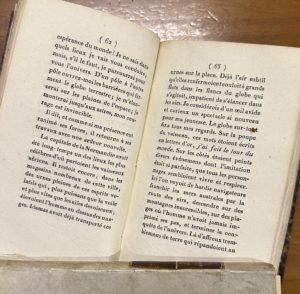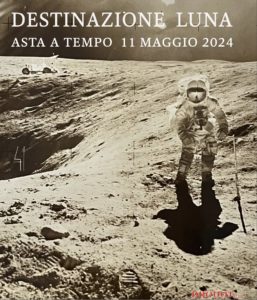Destination Moon
«When the Soviet Union launched Sputnik a little more than a half century ago, Americans were stunned: the Russians had beaten us to space. We had a choice to make: we could accept defeat – or we could accept the challenge. And as always, we chose to accept the challenge…» (President Barack Obama, National Academy of Sciences, 27 April 2009)
“Destination Moon”—the catalog for Senegallia’s forthcoming auction—was produced in collaboration with Victor Letemplier, an Erasmus student currently studying at the Academy of Fine Arts in Urbino. The conquest of space continues to captivate the younger generation. This catalog features documents from the Soviet space program and earlier ventures involving aircraft and hot-air balloons. Additionally, it includes a collection of original documents from Raymond Loewy’s studio, showcasing pioneering designs for the first space toilets. The catalog also presents a series of striking photographs taken from the skylights of orbital stations, offering new extraterrestrial images that have enriched our human culture with their shapes and colors.
… The world was coming to an end. Pollution had invaded cities. Animal species had become extinct. After the others, the bees had disappeared, then the butterflies, desire was dead. Men were no longer having children.
A poet decided to describe the process, but his book made him sad. No sooner had he sketched out the finale than Jean-Baptiste Cousin de Grainville went into the canal near his home to drown. In those rainy days, weeks lasted ten days and the French Revolutionary calendar indicates that 12 pluviôse an XIII (1er février 1805) was the duodi of the second decadededicated to broccoli.
Someone found the manuscript and published it without much care. But an Englishman was surprised and decided to translate it. A young woman read the translation and drew inspiration from it to write her Frankenstein. This was Marie Shelley.
As a result, Charles Nodier leading French critic sought out the manuscript to prepare a better edition, and here is a rare copy in this catalog. All this happened more than 200 years ago. Melancholy has accompanied poets since the beginning of the world.
Jean-Baptiste, Grainville, explains that civilization has reached the end of history. All peoples have connected. All knowledge has been changed. Images circulate at the speed of light. Men have visited all territories – “J’ai fait le Tour du Monde” is the name of the vessel. Desire is dead.
Grainville writes The Last Man, inspired by Genesis, and imagines the end of time consistent with the beginning.


Leave a Reply